Paul Levinson's Blog: Levinson at Large, page 168
January 23, 2019
Anon: Minor Work from a Great Writer and Director
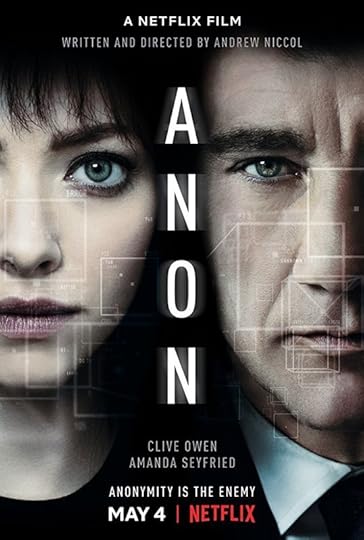
Andrew Niccol's Gattaca in 1997 remains one of the surprise all-time best science fiction movies, surprise because Gattaca was Niccol's first. His follow-up, The Truman Show in 1998, was even more lionized by some, but I didn't like nearly as much as Gattaca, which was stunning in its mix Brave New World totalitarian life and the yearning for space travel. I've seen some of Niccol's subsequent movies, but I honestly can't recall them.
Anon had all the right ingredients for another great movie - Clive Owen and Amanda Seyfried in the cast, and a kind of Philip K. Dick Minority Report story, with a police force that can scan people's minds and therein nab criminals (not before but after the act), and hackers who can cut up and out those images. Add to that a serial-killer hacker suspect (Seyfried) hunted by Owen (a detective who can mind scan), and they're sexually attracted to one another, and you could've had another great Niccol movie.
 There were lots of good scenes, savvy dialogue, wonderful locales (my favorite: Sal's apartment on Wadsworth Terrace in Manhattan), and a pretty good twist at the end (which I won't tell you), but Anon nonetheless lacked, I don't know, a certain depth and profundity, even though that's exactly what it was trying to convey. Anyone, especially police detectives, having access via your brain to what you see and do is a pretty traumatic and revolutionary development in human life, and for all the characters' remonstrating about that in the movie - or, in some cases, celebrating it - the ambience fell short of kicking you in the cosmic gut. Probably there was a little too much emphasis on the murders and the police work. Perhaps seeing scanning in other contexts a little more would have given Anon a more universal grounding.
There were lots of good scenes, savvy dialogue, wonderful locales (my favorite: Sal's apartment on Wadsworth Terrace in Manhattan), and a pretty good twist at the end (which I won't tell you), but Anon nonetheless lacked, I don't know, a certain depth and profundity, even though that's exactly what it was trying to convey. Anyone, especially police detectives, having access via your brain to what you see and do is a pretty traumatic and revolutionary development in human life, and for all the characters' remonstrating about that in the movie - or, in some cases, celebrating it - the ambience fell short of kicking you in the cosmic gut. Probably there was a little too much emphasis on the murders and the police work. Perhaps seeing scanning in other contexts a little more would have given Anon a more universal grounding.As it was, Anon is a good film, worth watching, but a minor work from a great director and writer. Hey, it's good enough that I'll definitely watch Niccol's next movie.
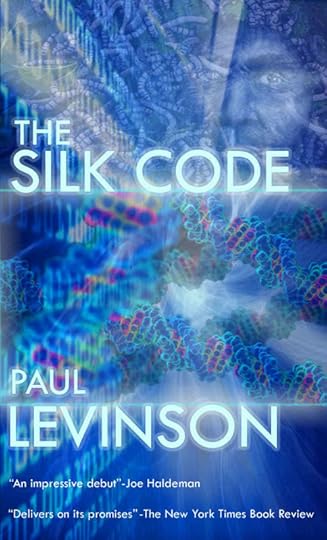
Paul Levinson's books ... Paul Levinson's music
Published on January 23, 2019 10:53
January 22, 2019
Project Bluebook 1.3: Peggy Sue Gets Space Ship

I'm continuing to enjoy Project Blue Book - as a science fiction story based on some actual events. Along those lines, it would be a great twist if Hynek himself was an extraterrestrial, wouldn't it. Such a move would have about the same relationship to reality as most of the other high points in this series.
Take our government organizing a massive coverup, and urging Hynek and Quinn to help them sell this to the public. The truth is that our government was engaged in all kinds of coverups in the Red-scare 50s. The government is no doubt involved in all kinds of coverups today. But that's still a long ways off from a coverup specifically being about sundry alien sightings.
Episode 1.3 takes us to Lubbock, Texas in 1951, where strange lights were seen for many nights in the sky, and, according to some reports, a guy's truck was demolished but he escaped physically unscathed. Hynek and Quinn investigate, and encounter a professor who concluded the lights were made by a formation of plovers - flying terrestrial birds, not extra-terrestrial spaceships (in reality, Hynek actually learned this from the professor years later, in 1959, but ok). Unsurprisingly, Hynek and Quinn don't put much credence in the professor's assessment, though Quinn is always happy to acquiesce to his superiors' commands. (I predict, though, that as this series progresses, he'll come to reject them.)
So Lubbock goes down as a major example of another government-suppressed incident of visitation from outer space. One facet not explored in this episode is the connection of all of this to Buddy Holly, Lubbock's best known citizen. He appeared on television for the first time in 1952, just a year after the Lights. He had a fabulous, original voice, and wrote irresistibly catchy songs, loved by the Beatles and everyone else. Could Buddy have been influenced by those lights in the sky, inspired by them to change the world with his music?
Now that would be a story.
See also: Project Blue Book 1.1: Science Fiction, Or? ... Project Blue 1.2: Calling Roy Thinnes
here I am talking Ancient Aliens a few years ago on the History Channel

Paul Levinson's books ... Paul Levinson's music
Published on January 22, 2019 21:01
January 20, 2019
Counterpart 2.6: Young Yaneks
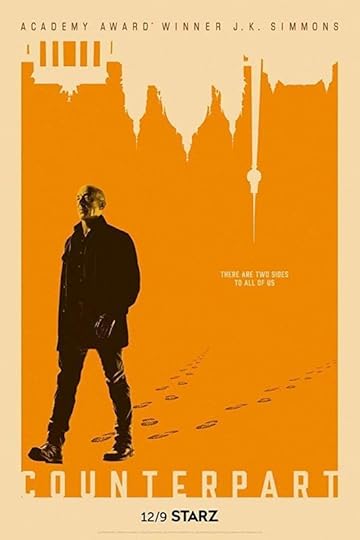
Well, I was right when I said in my review of Counterpart 2.5 that there was only one Yanek in the present, because he had killed his counterpart. I was wrong that Emily was/is his daughter - though Mira, especially older, does look a lot like Emily. All of this in tonight's Counterpart 2.6, plus at last a back story that tell us how the two worlds got here, and how the flu arose that wiped out so much of prime.
Parts of this looked like a 1950s movie, especially the moments when the two worlds came into being in that lab. This happened in East Berlin in 1987, and I guess that did have a look in common with the 1950s. But the 1950s had some joy, and there was little of that tonight, as Yanek and Yanek learn the hard way that two worlds are no bed of roses.
Yanek was indeed responsible for the split, as he left the "synchotron" unattended at a crucial time. He - they - were also responsible for the divergence of the two worlds, and for the development of the deadly flu virus. Significantly, we still don't know if the outbreak was by accident or intended. In a crucial sense, that hardly matters. The lesson here is don't create a deadly virus, because even if you don't deliberately deploy it, it could still wreak havoc by accident.
If I'm not mistaken, no one from the previous episodes - except the current, older Yanek, and his daughter Mira (or his double's daughter) - was in evidence tonight. That in itself is a pretty daring move in a television series.
And I liked the ending in which Mira tells her father's double that they will try to end all of this by permanently closing the bridge. It's only right that, having the created the two worlds, Yanek figures out a way to end the war between them. Of course, that won't end the two worlds. My prediction: the closing will come close to happening, but will fail.
See you next week(s).
a song about love and alternate realities
See also: Counterpart 2.1: "Strange" and "Lucky" ... Counterpart 2.2: The Emilys ... Counterpart 2.3: Echo ... Counterpart 2.4: Three Emilys and Yanek ... Counterpart 2.5: The World-Splitter
And see also Counterpart 1.1: Fringe on Espionage ... Counterpart 1.2: Two Different Worlds ... Counterpart 1.3: Identification and Pandemic ... Counterpart 1.4: The Switch ... Counterpart 1.5: Ménage à Alternates ... Counterpart 1.6: Alternate Prince, Funeral, and Clear Clare ... Counterpart 1.7: Spying Across Dimensions ... Counterpart 1.8: Conversations ... Counterpart 2.9: The Spy Who Came Into the Fold ...Counterpart Season 1 Finale: Stuck in the Middle

alternate Orson Welles in here
Paul Levinson's books ... Paul Levinson's music
Published on January 20, 2019 23:38
True Detective 3.3: Unquestioned Witnesses
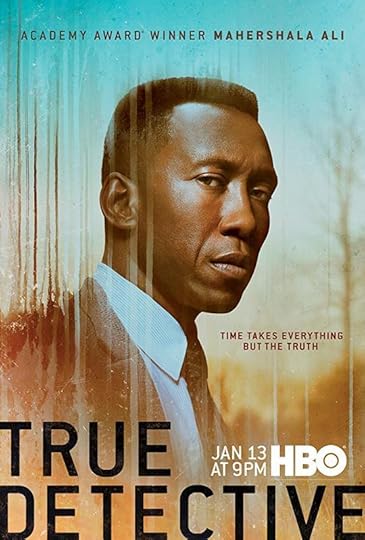
What struck me most about the taut, brooding third episode of the third season of True Detective - they all are, of course - just on tonight was what we find in the present, when the TV interviewer tells Hays about that bevy of unquestioned witnesses back in 1980. Hays recalls one of them - the farmer - and we saw Hays and West question him in 1980. But what about the others? Hays in the present may have forgotten them, but apparently they were never really questioned in 1980. There was no reason the TV interviewer would be making that up.
These witnesses and their reports of a brown sedan etc cruising the area get to the crux of the case so far. There was a lot more that happened back then that we don't know about, obviously. But so far everything we've seen shows Hays and West being good, highly motivated detectives - to say the least - so what really happened back then?
Clearly, it put a serious crimp in Hay's life. He's worried Becca's been kidnapped when she leaves his side for a few minutes in a store in 1990. Understandable. But he snaps at his wife when she tells him the progress she's made on the case - he can't bear to see her happy or satisfied about this case. What did he do so wrong, what he is so guilty about?
As I mentioned last week, the one bright side of this for Hays is that the documentary on the case in the present is getting him to "work" his brain, which can forestall at least some of his mental decline. My guess we'll see an ending in which Hays in the present solves what he couldn't in the case decades earlier, and then sinks into decline, deprived of the challenge of solving this puzzle.
Certainly not a happy ending for Hays, but it should be fascinating to see how he gets there.
See also True Detective 3.1-2: Humanistic Disturbances of the Soul
And see also Season Two: True Detective: All New ... True Detective 2.2: Pulling a Game of Thrones ... True Detective 2.3: Buckshot and Twitty ...True Detective 2.4: Shoot-out ... True Detective 2.7: Death and the Anti-Hero ... True Detective Season 2 Finale: Good Smoke but No Cigar
And see also Season One: True Detective: Socrates in Louisiana ... True Detective Season One Finale: Light above Darkness

philosophic crime fiction: The Plot to Save Socrates Paul Levinson's books ... Paul Levinson's music
Published on January 20, 2019 20:51
Outlander 4.12: "Through Time and Space"

A powerful episode 4.12 of Outlander tonight, with the best line is offered by Roger, who explains to the priest who "sinned" by sleeping with a Mohawk woman and fathered her child, that he (Roger) has traveled through time and space. I like that kind of talk in a time-travel story.
Roger also reveals to the priest and us that he had a chance to escape, but decided to stay. This means that the stones he saw in the forest were not a dream, just his 20th-century shower was. I'm very glad, for the sake of future stories, that there are time-travel stones in America after all.
Plot-wise, it's also good that Bonnet (likely) escaped. He's a man who does horrible things, but his survival is also good for future stories. Same with Murtagh - who is a good man - surviving.
But the Mohawk part of the story had some unbelievable aspects - or parts which required more explanation. Why should they care so much about the priest baptizing his child? They don't believe in the priest's religion. And it's also a little difficult to believe that Roger would be run back to save or help the priest, when he could have kept on running, back to his own time, or, even better, to Brianna. Indeed, unless he no longer loves Brianna, he would not sacrifice his own life, or so blatantly risk sacrificing it, which is what running back to Shadow Lake did for him.
And one last point - Fergus and Marsali going to Fraser's Ridge puts them right in line for that fire which started Brianna on her trip to save her parents in the first place. Looking forward to seeing how this turns out next week.
See also Outlander 4.1: The American Dream ... Outlander 4.2: Slavery ...Outlander 4.3: The Silver Filling ... Outlander 4.4: Bears and Worse and the Remedy ... Outlander 4.5: Chickens Coming Home to Roost ... Outlander 4.6: Jamie's Son ... Outlander 4.7: Brianna's Journey and Daddy ... Outlander 4.8: Ecstasy and Agony ... Outlander 4.9: Reunions ... Outlander 4.10: American Stone ... Outlander 4.11: Meets Pride and Prejudice
And see also Outlander Season 3 Debut: A Tale of Two Times and Places ...Outlander 3.2: Whole Lot of Loving, But ... Outlander 3.3: Free and Sad ... Outlander 3.4: Love Me Tender and Dylan ... Outlander 3.5: The 1960s and the Past ... Outlander 3.6: Reunion ... Outlander 3.7: The Other Wife ... Outlander 3.8: Pirates! ... Outlander 3.9: The Seas ...Outlander 3.10: Typhoid Story ... Outlander 3.11: Claire Crusoe ...Outlander 3.12: Geillis and Benjamin Button ... Outlander 3.13: Triple Ending
And see also Outlander 2.1: Split Hour ... Outlander 2.2: The King and the Forest ... Outlander 2.3: Mother and Dr. Dog ... Outlander 2.5: The Unappreciated Paradox ... Outlander 2.6: The Duel and the Offspring ...Outlander 2.7: Further into the Future ... Outlander 2.8: The Conversation ... Outlander 2.9: Flashbacks of the Future ... Outlander 2.10: One True Prediction and Counting ... Outlander 2.11: London Not Falling ... Outlander 2.12: Stubborn Fate and Scotland On and Off Screen ... Outlander Season 2 Finale: Decades
And see also Outlander 1.1-3: The Hope of Time Travel ... Outlander 1.6: Outstanding ... Outlander 1.7: Tender Intertemporal Polygamy ...Outlander 1.8: The Other Side ... Outlander 1.9: Spanking Good ... Outlander 1.10: A Glimmer of Paradox ... Outlander 1.11: Vaccination and Time Travel ... Outlander 1.12: Black Jack's Progeny ...Outlander 1.13: Mother's Day ... Outlander 1.14: All That Jazz ... Outlander Season 1 Finale: Let's Change History

Si Paul Levinson's books ... Paul Levinson's music
Published on January 20, 2019 18:58
Prime Suspect 1973/Tennison: Excellent

My wife and I binged Prime Suspect Tennison on Amazon Prime - originally Prime Suspect 1973 which is when this story of the young Tennison, just beginning her police career, takes place. The series has received some criticism for not measuring up to Prime Suspect in several ways. I disagree (my wife does, as well).
Of course Stefanie Martini as the young Tennison is not as good as Helen Mirren, who defined the brilliant older role. But who would be? I doubt that even a young Helen Mirren, if she could be brought to the future by some time travel magic to play this role, would be as accomplished as her older self.
And, indeed, the part called for a less accomplished performance, since Tennison was just finding herself. And whether or not Martini is also brilliant actress who delivered that performance, or is just less sure of herself, I couldn't say. All I know is that she was excellent in the part. As to the plot--
[spoilers follow, in case you haven't seen this yet]
But as to the plot, I thought this series also did a fine job of that. We need to see how Tennison in 1973 began to become the older Tennison we all know, love, and appreciate. And I think this series did that in two important ways, both involving DI Bradfield.
First, it's Bradfield who convinces her to lie on behalf of the detective who beat a suspect. This is a crucial moment in the development of Tennison's persona. She would never have risen so high in authority had she not learned to play the game. Her being conflicted between telling the truth and being a team player, and deciding to go with the team, was played out perfectly,
Second, Bradfield's death explains an awful lot about the older Tennison's outlook on life. She lost someone she loved, and found out he was married with kids in the bargain. Something like that is bound to harden anyone, and endow them with some degree of live for today.
So, good job 1973/Tennison, and I look forward to more (even though it's been "confirmed" that there won't be a second series).

Paul Levinson's books ... Paul Levinson's music
Published on January 20, 2019 15:57
Vikings 5.18: Demented Ivar
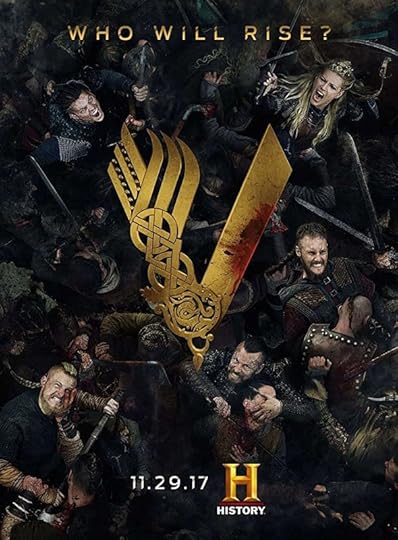
Ivar continues to go from bad to worse in Vikings 5.18, burning women, leaving his newborn son to die in the wilderness, because the son is born deformed, just like his father. Ivar's story this season has become a textbook tale of how and why an insane dictator comes to be that way.
In contrast, Ubbe is the soul of reason in England, talking two of the three Danish leaders into accepting his and King Alfred's offer of peace and land. Of course the third wants to attack - the course of war vs. negotiation never did run smooth.
Over in Iceland, Floki was never exactly 100% sane in the first place. From our 21st century perspective, his beginning to doubt the gods - actually, pretty much giving up on them - is a step in the right direction. Of the sundry stories being told this season, Floki's has the least connection to actual, recorded history. I'm therefore especially interested in how this will all turn out - at least, in the near future of this series.
Hvitserk, in contrast, has become more religious, though with an unexpected godly figure, the Buddha. In real history, the Vikings did get around to most of the world, and undoubtedly encountered followers of the Buddha in central Asia. What role this played in convincing King Olaf to join him against Ivar is not clear, but was good to see anyway.
And while we're on the subject of good to see, Judith and Lagertha make a nice pair of sincere conversationists, though it's uncertain how much longer either will continue as characters in this quickening series.
See you here next week.
See also Vikings 5.1-2: Floki in Iceland ... Vikings 5.3: Laughing Ivar ...Vikings 5.4: Four of More Good Stories ... Vikings 5.5: Meet Lawrence of Arabia ... Vikings 5.6: Meanwhile, Back Home ... Vikings 5.7: A Looming Trojan-War Battle, Vikings Style, and Two Beautiful Stories ...Vikings 5.8: Only Heahmund? ... Vikings 5.9: Rollo ... Vikings 5.10: New and Old Worlds ... Vikings 5.11: Rollo's Son ... Vikings 5.12: "The Beast with Two Backs" ... Vikings 5.13: The Sacrifice ... Vikings 5.14: Fake News in Kattegat ... Vikings 5.15: Battle ... Vikings 5.16: Peace and War ... Vikings 5.17: No Harmony in Iceland
And see also Vikings 4.1: I'll Still Take Paris ... Vikings 4.2: Sacred Texts ...Vikings 4.4: Speaking the Language ... Vikings 4.5: Knives ... Vikings 4.8: Ships Up Cliff ... Vikings 4.10: "God Bless Paris" ... Vikings 4.11: Ragnar's Sons ... Vikings 4.12: Two Expeditions ... Vikings 4.13: Family ... Vikings 4.14: Penultimate Ragnar? ... Vikings 4.15: Close of an Era ... Vikings 1.16: Musselman ... Vikings 1.17: Ivar's Wheels ...Vikings 1.18: The Beginning of Revenge ... Vikings 4.19: On the Verge of History ... Vikings 4.20: Ends and Starts
And see also Vikings 3.1. Fighting and Farming ... Vikings 3.2: Leonard Nimoy ...Vikings 3.3: We'll Always Have Paris ... Vikings 3.4: They Call Me the Wanderer ... Vikings 3.5: Massacre ... Vikings 3.6: Athelstan and Floki ...Vikings 3.7: At the Gates ... Vikings 3.8: Battle for Paris ... Vikings 3.9: The Conquered ... Vikings Season 3 Finale: Normandy
And see also Vikings 2.1-2: Upping the Ante of Conquest ... Vikings 2.4: Wise King ... Vikings 2.5: Caught in the Middle ... Vikings 2.6: The Guardians ...Vikings 2.7: Volatile Mix ... Vikings 2.8: Great Post-Apocalyptic Narrative ... Vikings Season 2 Finale: Satisfying, Surprising, Superb
And see also Vikings ... Vikings 1.2: Lindisfarne ... Vikings 1.3: The Priest ... Vikings 1.4: Twist and Testudo ... Vikings 1.5: Freud and Family ... Vikings 1.7: Religion and Battle ... Vikings 1.8: Sacrifice
... Vikings Season 1 Finale: Below the Ash

historical science fiction - a little further back in time
Paul Levinson's books ... Paul Levinson's music
Published on January 20, 2019 15:19
January 18, 2019
Nancy Pelosi is Second not Third in Line for the Presidency
My wife Tina called my attention to a funnily annoying meme last night: commentators on MSNBC keep saying that Nancy Pelosi (as Speaker of the House) is "third in line for the Presidency". I just heard Stephanie Ruhle and Malcolm Nance say that.
But, actually, the Speaker of the House is second not third in line. The President is not first in line - he's already there (unfortunately) in the White House. The first in line to succeed him is the VP. And the Speaker of House is second in line.
Look at it this way: if you're waiting in line to see a concert, the person who is lucky enough to be first in line is not yet seated or even in the theater. If the line has been moving, everyone who was first in line who entered the theater is no longer on line. (They could be online, reading their email or tweeting, but that's something else.)
Ruhle and Nance and everyone who has been getting this wrong could benefit from Bertrand Russell's theory of logical types. If you're counting all the clothespins in a bag, you don't count the bag, too. I realized a while ago that even people who pick up the trash understand this. You empty the garbage pail, but don't take the pail away with the garbage. The pail itself is not garbage.
Regarding the President, whoever is in that office is not on any line of succession. That's because the person in that Oval Office has already assumed that office. It's even incorrect to say that Nancy Pelosi is third in command. The responsibilities of government don't work that way. In many ways, the Speaker of the House is far more powerful than the Vice President.
But she does stand behind the Vice President in one very significant regard. She's second in line to succeed the President, behind the VP who is first in line.
Paul Levinson's books ... Paul Levinson's music
But, actually, the Speaker of the House is second not third in line. The President is not first in line - he's already there (unfortunately) in the White House. The first in line to succeed him is the VP. And the Speaker of House is second in line.
Look at it this way: if you're waiting in line to see a concert, the person who is lucky enough to be first in line is not yet seated or even in the theater. If the line has been moving, everyone who was first in line who entered the theater is no longer on line. (They could be online, reading their email or tweeting, but that's something else.)
Ruhle and Nance and everyone who has been getting this wrong could benefit from Bertrand Russell's theory of logical types. If you're counting all the clothespins in a bag, you don't count the bag, too. I realized a while ago that even people who pick up the trash understand this. You empty the garbage pail, but don't take the pail away with the garbage. The pail itself is not garbage.
Regarding the President, whoever is in that office is not on any line of succession. That's because the person in that Oval Office has already assumed that office. It's even incorrect to say that Nancy Pelosi is third in command. The responsibilities of government don't work that way. In many ways, the Speaker of the House is far more powerful than the Vice President.
But she does stand behind the Vice President in one very significant regard. She's second in line to succeed the President, behind the VP who is first in line.
Paul Levinson's books ... Paul Levinson's music
Published on January 18, 2019 10:53
January 17, 2019
The Orville 2.4: Billy Joel

An instantly classic episode of The Orville - 2.4 - tonight, in which Billy Joel plays a role. Yes, his long retirement tour proved to be a ruse for a trip in a time machine he took 400 years into the future, to join the crew of The Orville. No, not really. It was the music of Billy Joel that played a role tonight, and it's thoroughly believable that it would still be listened to and much admired by Captain Mercer.
The centerpiece of the plot concerns his budding romance with the lady cartographer, who, in a nice piece of twist, turns out to be a Krill that Mercer has had some bad history with. He killed her brother. The Krill and humans don't get along. And Teleya used some kind of genetic masking to pass The Orville's sensors and be identified as a human,
Before the episode is over, she and Mercer are not quite back at the precipice of love again. But Mercer has saved her life, and struck an important blow for interstellar-species detente. It's the kind of moment saw in the some of the Star Treks. But The Orville is increasingly blazing a path of its own in the stars and our popular culture.
The subplot was good, too. Gordon wants to climb up the ladder to command. It falls to Kelly to guide him, and she does a good of that with compassion and toughness, when needed. But I did miss Alara, and I'm still eager to know if she's off the show. A search of our 2019 Internet shows no one knows what's going on with her. My recommendation: weave her departure into some long-range plot, and bring her back before the end of the season.
In the meantime, keep playing Billy Joel. My request for his next number: "Say Goodbye to Hollywood".
See also The Orville 2.1: Relief and Romance ... The Orville 2.2: Porn Addiction and Planetary Disintegration ... The Orville 2.3: Alara
And see also The Orville 1.1-1.5: Star Trek's Back ... The Orville 1.6-9: Masterful ... The Orville 1.10: Bring in the Clowns ... The Orville 1.11: Eating Yaphit ... The Orville 1.12: Faith in Reason and the Prime Directive

1st starship to Alpha Centauri ... had only enough fuel to get there
Paul Levinson's books ... Paul Levinson's music
Published on January 17, 2019 20:00
You: Review from An Unconflicted Fan

I've been hearing a lot about You recently - originally on Lifetime, more recently binge-able on Netflix - usually along the lines of "I didn't like it at all, but I couldn't help watching it". Count me as someone who also couldn't help watching it, but/because I liked it a lot. Indeed, pathbreaking, revelatory, and tour de force are not too much to say about it. Including that last episode, and that jolt of an ending.
The series has something of American Psycho in it - being about a stalker and a kind of serial killer - but it's much more than that. It's about why people are especially afraid to fall in love with people who love them deeply. It's about the power of books, and words, and lies. And it's about a world - our world - in which social media have made it so easy to deceive.
Our protagonist Joe Goldberg (who manages a bookstore with a handy basement) does have a heart in him somewhere, as Beck, his obsession, tells him. He does his utmost to protect Paco, his neighbor's son, in danger of being beaten by the lout who lives with Paco's mother. Joe will do almost anything to support and protect Beck, except when that gets in the way of his own self-preservation. He may be a sociopath, but he's a much better than average boyfriend.
There's a literacy in this story, more than a passing glance at fables and white and black knights and princesses, which leaven the depravity, and serves as almost a co-equal foundation of the series. There's an understanding of human nature, what makes us all tick, that supports Freud's contention that the difference between sanity and psychosis can be razor thin. All of this animates a plot that's full of surprises and twists, though I did guess a few of them. Penn Badgley as Joe and Elizabeth Lail as Beck are just perfect in their parts, and I can well understand why Joe loves Beck so hard.
Netflix has called for a second season. I'll be watching it for sure, an unconflicted fan.
 Paul Levinson's books ... Paul Levinson's music
Paul Levinson's books ... Paul Levinson's music
Published on January 17, 2019 00:35
Levinson at Large
At present, I'll be automatically porting over blog posts from my main blog, Paul Levinson's Infinite Regress. These consist of literate (I hope) reviews of mostly television, with some reviews of mov
At present, I'll be automatically porting over blog posts from my main blog, Paul Levinson's Infinite Regress. These consist of literate (I hope) reviews of mostly television, with some reviews of movies, books, music, and discussions of politics and world events mixed in. You'll also find links to my Light On Light Through podcast.
...more
- Paul Levinson's profile
- 341 followers



